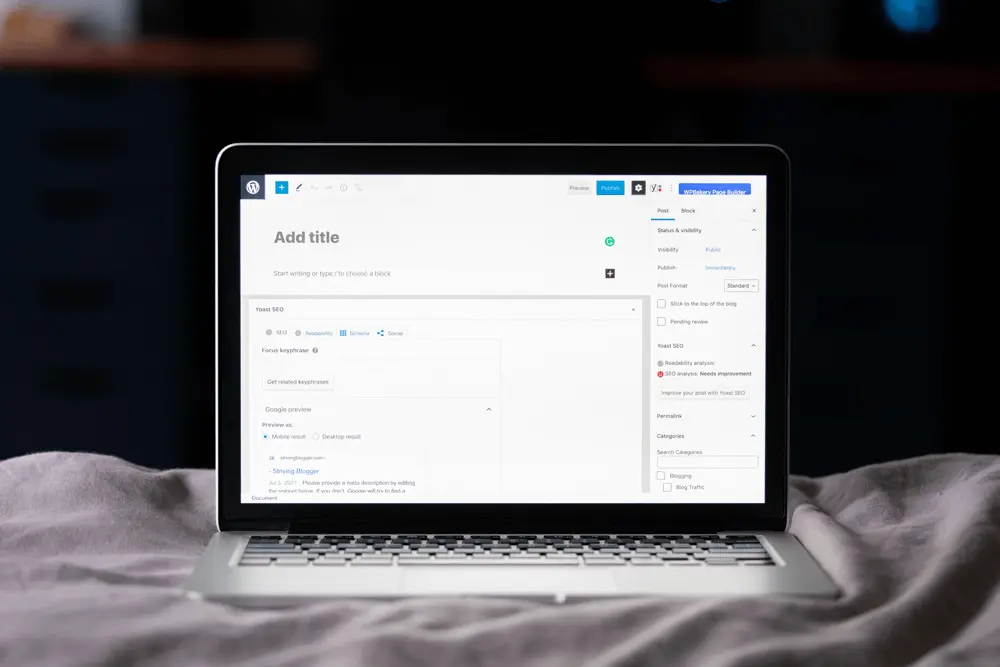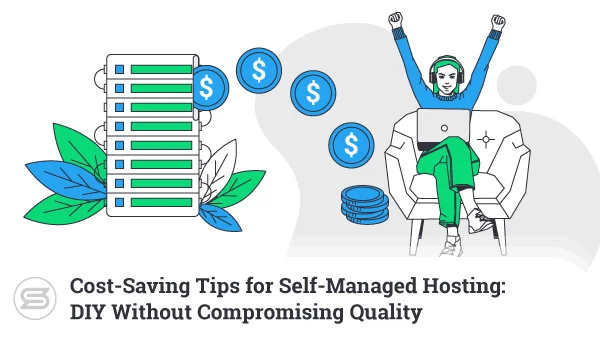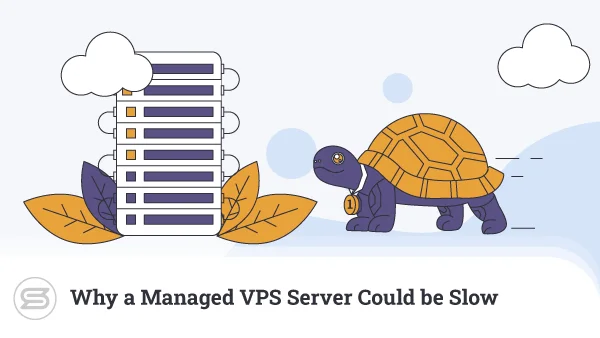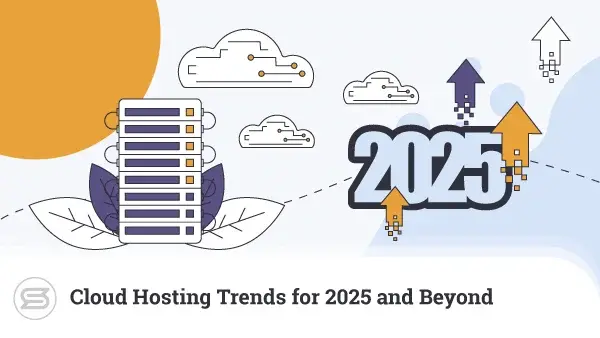The sheer number of WordPress hosting options could be overwhelming for less experienced users, and many may find it hard to distinguish between the different services.
Case in point – the difference between shared and VPS hosting.
Shared hosting is the cheapest form of hosting and is billed as the perfect starting point for any WordPress site. Virtual private servers (that’s what VPS stands for), on the other hand, are an excellent solution for projects with serious growth plans.
But how do these services actually affect your site? Which one should you choose at the beginning? And at which point should you consider an upgrade?
Today, we’ll help you figure out the answers to these questions.
What is WordPress Hosting?
First, we need to see how different hosting services work and how they affect your WordPress project.
Every software application has minimum system requirements, and in the case of WordPress, they’re quite low. The CMS can even run on an old computer with as little as 512MB of RAM.
However, add a few plugins, a theme, and some traffic, and all of a sudden, the resources you need are much more significant. And if you can’t provide them, the performance will deteriorate, and you may experience downtime. That’s why instead of running their websites on their own hardware, WordPress users purchase hosting accounts.
Both shared and VPS hosting plans provide your WordPress website with the hardware resources (processing power, storage, memory, and internet connectivity) it needs to run and be accessible worldwide.
The difference lies in the way these resources are delivered.

Shared vs. VPS WordPress Hosting
Shared hosting plans are cheap because they allow providers to host many websites on a single physical server. Every shared account gets a directory on that server where users store their files and databases. As an account owner, you can use the server’s hardware resources, and so can everyone else hosted on the same machine.
With a virtual private server, the setup is different. Instead of a folder on a shared server where you save your data, you have an entire virtual machine all to yourself. It has a predetermined set of hardware resources and a dedicated IP reserved for your use only. Your VPS is completely isolated from other virtual machines deployed by the same host, and your site can’t be affected by other accounts.
So, which is the better option?
Shared hosting works as long as the shared machine isn’t under heavy load. As soon as the strain on the physical machine increases, the performance drops. And the more websites you have on the same server, the higher the risk of overloading it.
Unfortunately, to maximize their profits, many hosting providers situate too many accounts on the same server and overstretch the hardware’s capacity. Even under normal circumstances, this may compromise loading speeds, and traffic spikes can cause further problems.
Anyone on the server may (willingly or not) attract a large number of clicks and immediately disrupt the performance of everyone else sharing the same machine. You won’t know who is causing the heavy load, and you definitely won’t know when it will subside.
DDoS attacks also overload a shared machine very quickly. Once again, your site will suffer the consequences, regardless of whether or not it’s the target.
None of these is a concern if you use a VPS, which is just one of the reasons why it’s a far superior solution. Let’s explore its advantages in more detail.
WordPress VPS Hosting Benefits
Compared to shared hosting, a virtual private server excels in pretty much every aspect of the service.
Speed and performance
Your website will only perform well if it has access to adequate resources.
This is difficult to achieve with a shared plan because the hardware of a single physical machine is used by a large number of websites. If you have a small personal blog or a simple business website with low traffic volumes, you may be fine. Anything bigger, however, and the shared environment’s limitations will start affecting your site’s loading speeds.
To avoid this, consider a VPS upgrade. Different virtual server plans offer different hardware resources, but even the entry-level options are a step up from a typical shared account. Cloud VPS options even let you customize the number of CPU cores, memory, and storage space. Spec your server well, and it will be more than capable of displaying excellent performance even under heavy load.
Reliability
Your shared account’s performance depends on the performance of the shared server, which, in turn, depends on the load generated by the websites hosted on the machine. In other words, your site’s loading speeds are almost completely outside your control. You have to hope that your “neighbors” won’t overload the server or do anything else that may affect your site – rarely a good strategy.
By contrast, a virtual server’s resources are guaranteed. They are reserved specifically for your account and are available all the time, so your site’s performance isn’t susceptible to any outside factors.
This is important, as consistently high loading speeds are an important user experience factor. And when Google ranks websites on its results pages, the user experience is one of the most important considerations.

Security
Unlike shared hosting, virtual servers can provide a completely isolated environment for your website. Your VPS has its own operating system and works independently from all other accounts, meaning you won’t be affected when another website hosted on the same infrastructure gets compromised.
Because you have a standalone machine, you also have more control over its security features. For example, you can configure the firewall and open or close ports to set access levels to your exact specifications.
Email deliverability
A shared server has a single IP used by all accounts hosted on the machine. Every outgoing email passes through that IP, which shouldn’t be too much of a problem as long as users stick to the rules. The trouble is, users don’t always stick to the rules.
Surveys suggest that as much as 45% of all emails are spam, so statistically, there’s a very high likelihood someone else on your shared server may be sending out unsolicited messages. It may not even be a deliberate act.
Hackers often compromise random, poorly protected hosting accounts with the goal of using them in spam campaigns. As is often the case in a shared environment, this action usually has wider repercussions.
When they detect a spam email, security companies quickly identify the source and blacklist its IP address. If the unsolicited messages are coming from an account on your shared server, the blocked address is the one you’re using, so your emails will also be redirected to the recipient’s junk folder.
This is not something you need to worry about if you use a virtual server. With it, you have a dedicated IP that only you will use. Stick to the rules, and you won’t have any problems.
Scalability
An online project can’t sit still. If you want to attract new visitors and keep existing ones interested, you must regularly update your website. In the case of WordPress, this means not only adding new content but also introducing features with the help of plugins. Do it correctly, and you’re bound to see traffic levels grow.
The thing is, your hosting plan must be able to accommodate this growth, and no other service can do it as well as a VPS.
A virtual server is inherently easy to scale, especially if it’s deployed in a cloud environment. It can tap into an enormous pool of resources, so whenever you need more CPU cores, RAM, or disk space, you can add them with a few clicks. The process rarely requires anything more than a reboot – there’s no need to migrate the website or change the domain’s settings.

Customizability
Because you have the entire server to yourself, a VPS plan gives you many options to tailor the hosting environment to your specifications. The actual level of customization depends on the type of VPS you pick.
If you want full control of the server, you’ll likely choose a self-managed solution. These plans give you root access to the virtual machine and complete freedom to do whatever you want. You can install your own software and configure it to suit your project’s needs.
On the other hand, if you need a standard setup and prefer not to get too involved in the technical stuff, you’re better off with a managed VPS plan. With it, the provider is responsible for setting up and maintaining the hosting environment, and you can focus on building your project without spending hours trying to find the correct command. Instead, a managed virtual server gives you access to a web hosting control panel – a suite of tools that help you launch and run your projects through a point-and-click interface. With the control panel, you can create a user account, install WordPress, set up a few email boxes, and get your website going in no time.
In both cases, the freedom to do whatever you want with your VPS is unmatched by the cheaper shared alternatives.


When Should I Consider Upgrading to WordPress VPS Hosting?
Clearly, a VPS has many advantages over a shared account. In fact, the only thing stopping you from getting one is usually the budget.
VPS solutions are more expensive than shared plans, and, understandably, many people prefer to save a few dollars, opting to start their WordPress projects with the more affordable option. Indeed, many websites created with the world’s top content management system can happily spend the initial stages of their development on a shared server.
However, as your site grows, you’ll eventually see that an upgrade to a VPS is inevitable. To ensure a smooth transition and maintain the high-quality service your visitors are used to, you have to get the timing right. Any significant delays may drive users away and cause lasting damage to the entire business.
Here are some of the signals showing you that it’s time to consider getting a virtual server.

Your site is slowing down
If your site is slower than it used to be, it’s definitely time to switch to a VPS solution. Any drops in performance negatively affect the user experience, and people are bound to stop interacting with your site. If you don’t take the necessary precautions, your search engine rankings will also suffer, so make sure you don’t underestimate the problem.
Your project has exceeded your account’s limitations
Slow loading speeds are just one indicator that you’ve exceeded the capacity of your shared hosting account. Shared plans often have limits on things like the number of domains you can host, the inodes you can upload, and the bandwidth you use.
Keep an eye on these limits, and if you’re getting close to them, consider an upgrade. With a VPS, you have full control over what happens on your server, so it’s up to you to decide how many websites you’ll have on it. Depending on the provider, your virtual server plan may have some restrictions, but these packages are usually built for bigger projects, so you’re much less likely to run into any troubles.
You’re making money from your website
Creating a profitable business venture is the goal of most people who start a WordPress website. When you achieve this milestone, you may want to invest some money back into the project. Upgrading your hosting service to a VPS will ensure the site provides the security and smooth user experience visitors expect. Crucially, it will do it in the long run.
The additional resources will help you make your business more sustainable and ensure the number of returning customers grows further.

Your site handles sensitive information
There are a few security concerns surrounding shared hosting, stemming from the fact that you essentially have a single file system handling the data of hundreds of websites. Attack that file system successfully, and you can cause a lot of damage. And the more websites hosted on the server, the more potential points of entry you have.
At this point, we should mention that breaches of shared hosting servers aren’t a daily occurrence. Owners of personal blogs and small websites who follow security best practices happily run their projects in a shared environment without any issues.
However, if you’re growing an online business that processes personal or payment information, it’s best not to take any chances and go for the more secure VPS option.
The most significant benefit from a security standpoint is that your virtual server is fenced off. It’s completely isolated, so you don’t need to worry about attacks against other websites affecting you. Furthermore, you can control the server’s security configuration and take preventive measures against specific threats.
The higher the stakes, the more sense it makes to be extra careful.
You need reliable email communication
Some projects depend on the reliable delivery of emails to the intended inboxes. If yours is one of them, consider moving to a virtual private server.
Instead of a single IP serving the outbound messages of hundreds of people, you have a dedicated address explicitly reserved for you. Only your communication will be handled by your server’s IP, so there’s no danger of anyone else sending spam, blacklisting the server, and blocking your emails.
You need a cost-effective solution with enough room for growth.
VPS hosting isn’t the only powerful hosting solution out there. You also have dedicated servers where entire physical machines are reserved for individual projects. For years, they were considered the most advanced form of hosting, but certain limitations now make them inferior to modern cloud VPS solutions.
For example, if you reach the limit of a dedicated server, you need to move to a completely different machine – a lengthy process that hides quite a few risks. By contrast, a modern cloud-based VPS can be upgraded with a couple of clicks and is infinitely scalable. No matter how big and popular your website is, a virtual server will be able to accommodate it.

Conclusion
Choosing a hosting plan for your WordPress website seems like a reasonably straightforward job. In essence, you can’t beat a VPS. It’s unmatched in terms of power and flexibility, and if you go for a managed solution, it’s pretty easy to use, as well. Usually, the only thing keeping people on a cheaper shared plan is the price.
If you’re going to run a successful online project, you have to keep a close eye on the budget. However, as your website grows, there will come a point when an upgrade will be required. It’s important to notice the moment and take timely action in order to stay ahead of the competition.
FAQ
Q: Do I Need a VPS for WordPress?
A: A small WordPress website with low traffic volumes can run on a standard shared hosting plan. However, any growth in complexity or popularity, and you’ll likely need an upgrade to a more powerful solution. When this moment comes, a VPS will be the obvious choice.
Q: What is the difference between shared and VPS hosting?
A: With shared hosting, the resources of a single physical server are shared among hundreds of websites. VPS hosting also allows the same hardware to serve multiple accounts. However, this time, a virtualization layer isolates individual virtual servers, resulting in more reliable performance and better security.
Q: Which type of hosting is best for WordPress?
A: Virtual private servers sit head and shoulders above all other forms of web hosting. They’re more powerful, reliable, and secure than shared plans, and they’re more cost-effective and flexible than the traditional dedicated server. So, if you want the best possible service, a VPS plan is the way to go.



